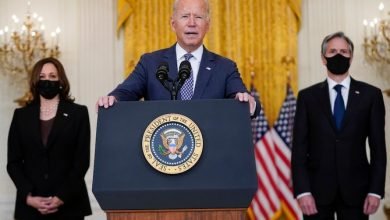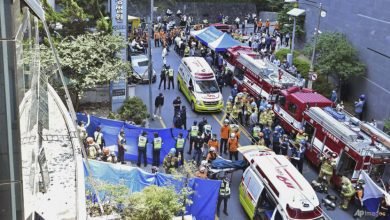Ultraconservative cleric Raisi wins Iran presidential vote

SMA NEWS – Tehran
Congratulations poured in for Iranian ultraconservative cleric Ebrahim Raisi on Saturday for winning presidential elections even before official results were announced.
Iran’s outgoing moderate President Hassan Rouhani said his successor had been elected in the previous day’s vote, without naming the widely expected winner, Raisi.
“I congratulate the people on their choice,” said Rouhani. “My official congratulations will come later, but we know who got enough votes in this election and who is elected today by the people.”
The other two ultraconservative candidates – Mohsen Rezai and Amirhossein Ghazizadeh-Hashemi – explicitly congratulated Raisi.
“I congratulate … Raisi, elected by the nation,” Ghazizadeh-Hashemi said, quoted by Iranian media.
And Rezai tweeted that he hoped Raisi could build “a strong and popular government to solve the country’s problems”.
The only reformist in the race, former central bank governor Abdolnasser Hemmati, also tweeted his congratulations to Raisi.
Raisi, 60, would take over from moderate Rouhani at a time the Islamic republic is seeking to salvage its tattered nuclear deal with major powers and free itself from punishing US sanctions that have driven a painful economic downturn.
Raisi, the head of the judiciary whose black turban signifies direct descent from Islam’s Prophet Muhammad, is seen as close to the 81-year-old supreme leader, Ayatollah Ali Khamenei, who has ultimate political power in Iran.
The moderate candidate in Iran’s presidential election has conceded he lost to the country’s hard-line judiciary chief.
Former Central Bank chief Abdolnasser Hemmati wrote on Instagram to judiciary chief Ebrahim Raisi early Saturday.
Hemmati wrote: “I hope your administration provides causes for pride for the Islamic Republic of Iran, improves the economy and life with comfort and welfare for the great nation of Iran.”
Voting on Friday was extended by two hours past the original midnight deadline amid fears of a low turnout of 50 percent or less.
Many voters chose to stay away after the field of some 600 hopefuls was winnowed down to seven candidates, all men, excluding an ex-president and a former parliament speaker.
Three of the vetted candidates dropped out of the race two days before Friday’s election, and two of them threw their support behind Raisi.
Former populist president Mahmoud Ahmadinejad, one of those who were disqualified by the powerful 12-member Guardian Council of clerics and jurists, joined those who said they would not cast their ballot.
Raisi’s only rival from the reformist camp was the low-profile former central bank chief Abdolnaser Hemmati, 65, who had polled in the low single digits before the election.
Iran’s electorate, of now almost 60 million eligible voters, has delivered surprise results before, observers warn. If no clear winner emerges, a runoff will be held next Friday.
On election day, pictures of often flag-waving voters in the country of 83 million dominated state TV coverage, but away from the polling stations some voiced anger at what they saw as a stage-managed election.
“Whether I vote or not, someone has already been elected,” scoffed Tehran shopkeeper Saeed Zareie. “They organize the elections for the media.”
Enthusiasm has been dampened further by the economic malaise of spiralling inflation and job losses, and the pandemic that proved more deadly in Iran than anywhere else in the region, killing more than 80,000 people by the official count.
Among those who lined up to vote at schools, mosques and community centers, many said they supported Raisi, who has promised to fight corruption, help the poor and build millions of flats for low-income families.
A nurse named Sahebiyan said she backed the frontrunner for his anti-graft credentials and on hopes he would “move the country forward… and save the people from economic, cultural and social deprivation.”
Raisi has been named in Iranian media as a possible successor to Khamenei.
To opposition and human rights groups, his name is linked to the mass execution of political prisoners in 1988. The US government has sanctioned him over the purge, in which Raisi has denied playing a part.






